America's 'invisible' Muslims
- Published
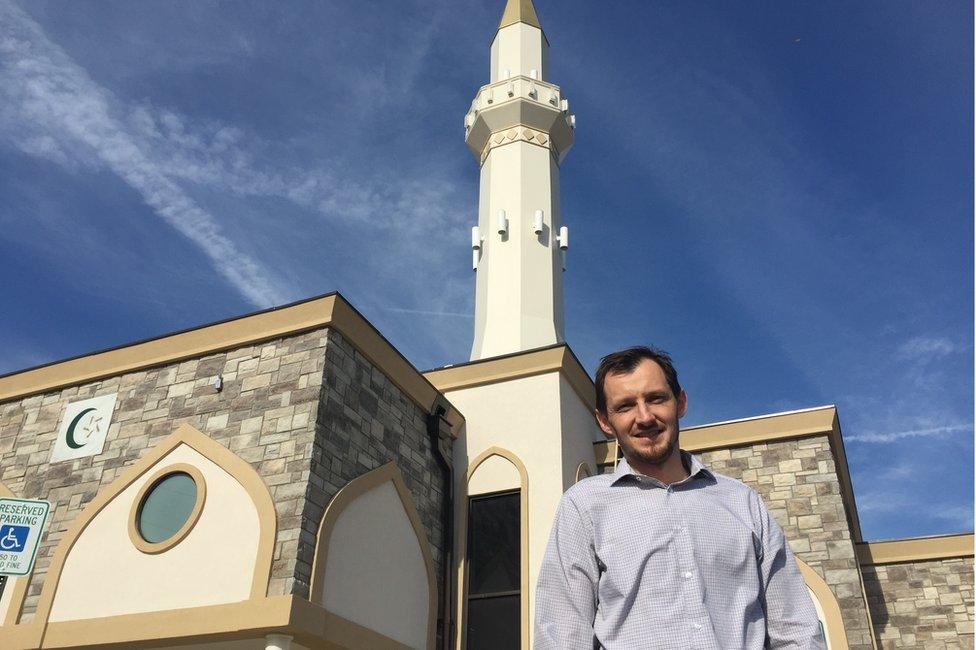
Imam Eldin Susa outside St Louis Islamic Center Nur
Two decades ago, Muslim refugees fleeing Bosnia arrived in St Louis and became a crucial part of the city. Now anti-immigrant fervour might lead the Bosnians of St Louis to become more politically active.
Imam Eldin Susa recounts how a family of recent immigrants from the Middle East was threatened at gunpoint while looking for housing in Affton, a leafy suburb of St Louis, Missouri.
"From their faces, it was obvious from where they came," he says - and the firearm-wielding resident wasn't happy about the prospect of such new neighbours.
Dzemal Bijedic, a Muslim chaplain with the St Louis police, says a Muslim woman waiting for a bus recently was set upon by five men who shouted anti-Islamic slurs and tried to tear off her hijab.
Eventually onlookers intervened.
"Some of the people fear when they see a Middle Eastern family," Bijedic says. "They tell them to go back to their country; that they're terrorists."
Ajlina Karamehic-Muratovic, a professor at St Louis University, says she's been involved in conversations where she was shocked to hear casual anti-Islamic views by people who didn't know they were talking about her own faith.
For Susa, Bijedic and Karamehic-Muratovic, Islamophobia is real.
All three are in a peculiar position, however. They're part of St Louis's community of Bosnian immigrants - one of the true modern success stories of refugee integration into US society. They can both identify with victims of Islamophobia and yet not bear the brunt of its pain.
Despite their background as refugees and Muslims - two characteristics that have become hot-buttons in 2016 US politics - they are, in the words of Karamehic-Muratovic, "invisible".
Bosnian immigrants are European. They dress in Western clothes. They don't stand out in a crowd.
"I think it helps that we are white," says the petite blonde professor. "We look like we fit in until you notice the accent."
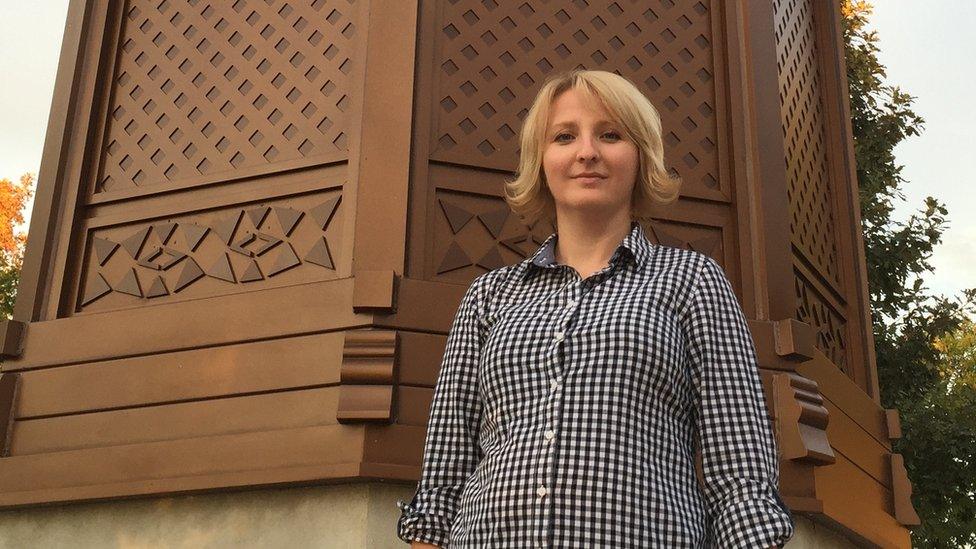
Ajlina Karamehic-Muratovic says she's heard anti-Islam comments from those who don't know she's Muslim
A new hope for St Louis
There are currently an estimated 70,000 Bosnian immigrants living in the St Louis area. The vast majority arrived in the 1990s, fleeing their home country's bloody civil war.
Some settled directly in St Louis, thanks to the efforts of city leaders eager to revitalise decaying neighbourhoods and stem a steady population decline that was eroding the city's tax base.
"Immigration and refugee-welcoming has, in a big way, been able to turn around hollowed-out urban cores, including in St Louis" says Blake Hamilton of the International Institute of St Louis, one of a handful of officially recognised refugee resettlement organisations in the US.
The Bosnians rented apartments and bought homes in southern St Louis, an area that had fallen on hard times. They took jobs as in construction and opened shops and restaurants.
"The Bosnians had skills that met the gaps that we had in the '90s," Hamilton says. "There was cheap housing available, jobs that paid the bills and a budding community."



That budding community flourished once the first wave of refugees established a foothold in St Louis. Bosnians who had originally settled elsewhere in the US soon followed, as word spread of the opportunities in this American heartland metropolis on the banks of the Mississippi River.
The International Institute and the City of St Louis are continuing efforts to bring in and integrate refugees - now from places like Syria, Iraq, Afghanistan and Somalia. The political climate is much different than it was in the 1990s, however. The Bosnians in St Louis see this, and they're doing what they can to help.
"The Bosnian community has been great in terms of community outreach - and the volunteer organisations that have grown from them, kind of organically," Hamilton says.
"We can point to the success of the Bosnian community, and how they've integrated into the fabric here. We have very high hopes that the new refugees can follow that same path."
A 'human point of view'
Eldin Susa sits behind a desk in an office cluttered with half-unpacked boxes.
The rooms in his mosque still smell of fresh paint, and a long ladder leans against the side of the building, in the shadow of a tall minaret topped by a crescent moon and star.
Although the St Louis Islamic Center Nur in the suburb of Affton only recently opened for services, Susa and his family have been in the St Louis area for nearly a year and a half, and he's been laying the groundwork for his religious community ever since.
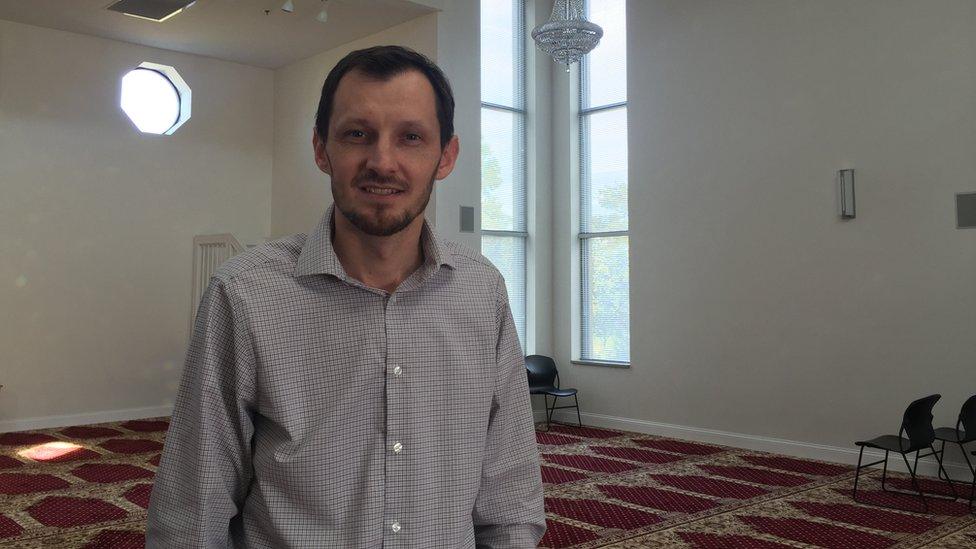
Eldin Susa recently visited several Christian churches to discuss what his mosque - and Islam - is all about
To foster understanding, he visits Christian churches in the area - which has seen an influx of Bosnians moving to the neighbourhood for larger homes and better schools (the local public school system, which Susa's children attend, is roughly 20% Bosnian).
The 33-year-old Susa describes the expressions of surprise he sees when he walks into a new church.
Youthful, lean and tall, with a close-cropped beard and often dressed in slacks and Oxford shirt, he doesn't look the way they imagine an imam to be.
He's clearly aware that Bosnians, when they want, can blend in.
"Probably for Bosnians it's easier for them to get integrated and not to be seen," he says. "I'm not proud of it. It shouldn't matter how you look. Everyone should be accepted the same way."
The local question-and-answer sessions often turn to addressing accusations that his religion is inextricably linked to violence, intolerance and terrorism.
"I tell them that there are some who are perverting Islam, who are cutting off heads and saying they do that in the name of Islam," he says.
"The first thing I say is that the name, Islam, means the religion of peace."
And when people tell him Bosnians Muslim are different, that they have proven to be hard workers and a boon to the St Louis economy, and that doesn't necessarily translate to other immigrants from strikingly different cultures and circumstances?
"I say that we shouldn't just look at immigrants from the economic point of view," he answers.
"We should look to them from the human point of view. We should look to them as those who are fleeing war, who are fleeing killing, who are fleeing oppression. As humans we are obliged to help those people; to give them protection."
Big city, Little Bosnia
If Affton is the future of the St Louis area Bosnian community - with shiny new mosques, single-family homes and quiet suburban streets - Bevo Mill, in south St Louis, is its past and, largely, its present.
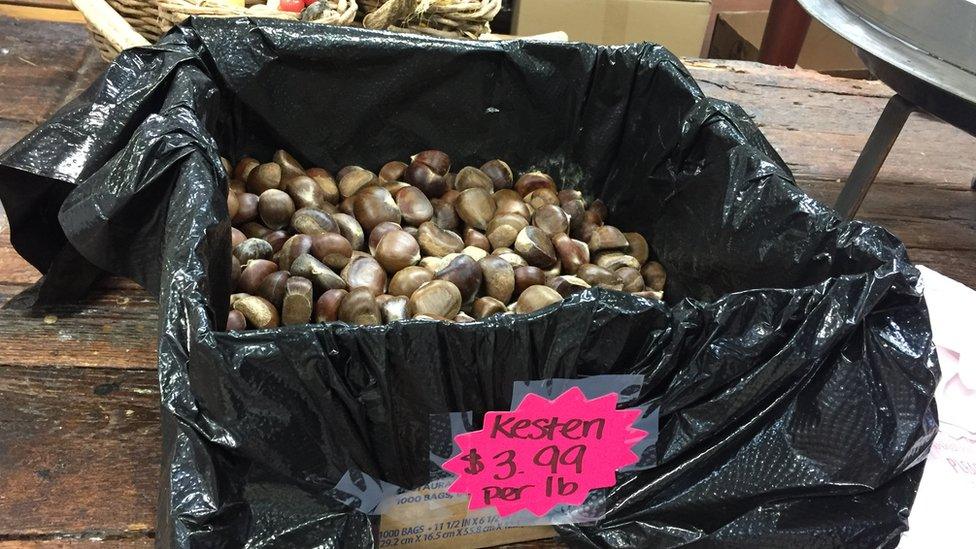
Chestnuts in a Bevo Mill market
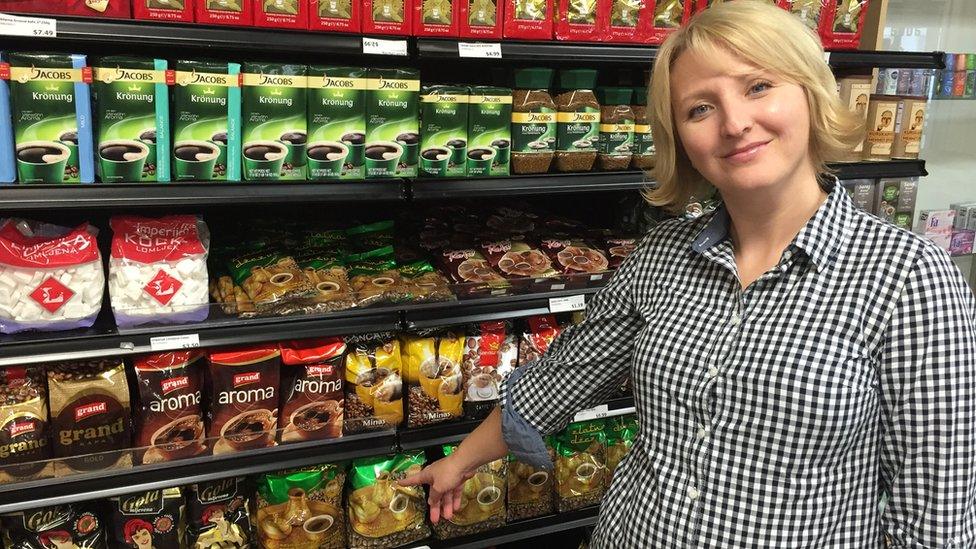
Karamehic-Muratovic, the St Louis University professor, walks along Gravois Avenue, the formerly blighted thoroughfare that two decades ago became the focal point of Bosnian refugee relocation. Known as "Little Bosnia", the neighbourhood continues to be the cultural centre of the immigrant community.
She points to a market that offers all the tastes of home - Bosnian beer, snacks, smoked meat, breads and bins full of chestnuts. She still shops here, even though she lives in the north of the city.
At a local Chamber of Commerce, young girls twirl and hop as they learn Bosnian folk dances. A stern-faced woman explains that this is not a public performance - the youngsters cannot be distracted from their practices.
In 2013, the Bosnian community here built a replica of the Sebilj, an ornate wooden fountain in the Bosnian capital of Sarajevo, and gave it as a gift to the city on the 250th anniversary of its founding,
Bosnian President Zeljko Komsic came to St Louis to join Mayor Francis Slay - the grandson of Lebanese immigrants - during the monument's public ground-breaking.
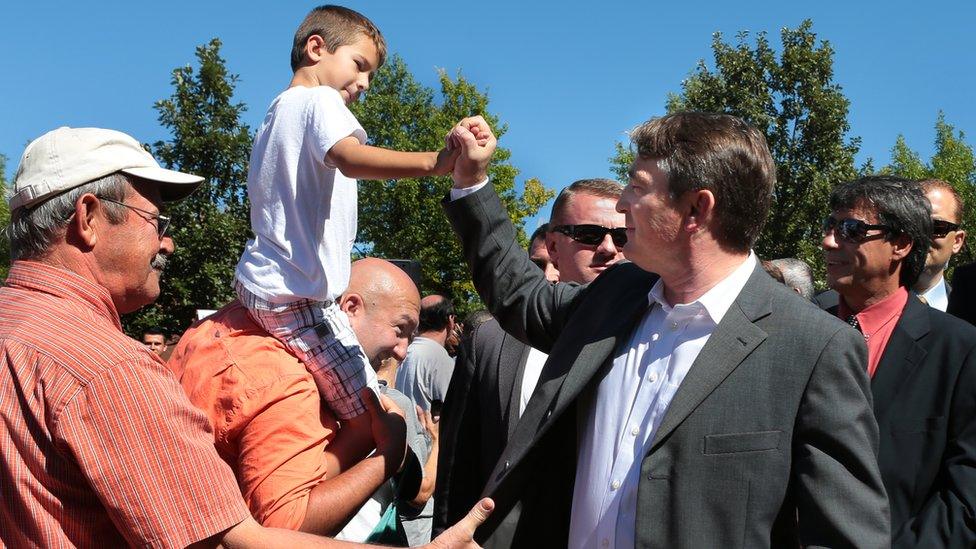
Bosnian President Zeljko Komsic (right) shakes hands with a young man following the groundbreaking of a sebilj in 2013
"Everyone told me they are proud and happy to have Bosnians here," Komsic told the crowd, external that had gathered for the event. "And for that, I am proud of you."
Karamehic-Muratovic herself arrived in the US for university before the start of the Yugoslavian civil war, with its massive civilian casualties and displacement of the nation's Bosnian population.
She says she lost touch with relatives during the fighting and long siege of Sarajevo, near her childhood home. A 17-year-old cousin with whom she was close was killed toward the end of the conflict.
Now, she studies the impact the war had on her community's mental health.
"Many Bosnians that you will meet here have been in detention camps, including women," she says.
"It is very hard to establish a normal life, and go to work, and worry about normal daily routine things when you've been through such an ordeal."
Children of the refugees also have problems. Quicker to learn English than their parents, they often served as translators, which changed the power dynamic in homes.
They also often feel torn between their Bosnian culture and the American influences. Drugs and delinquency are a concern.
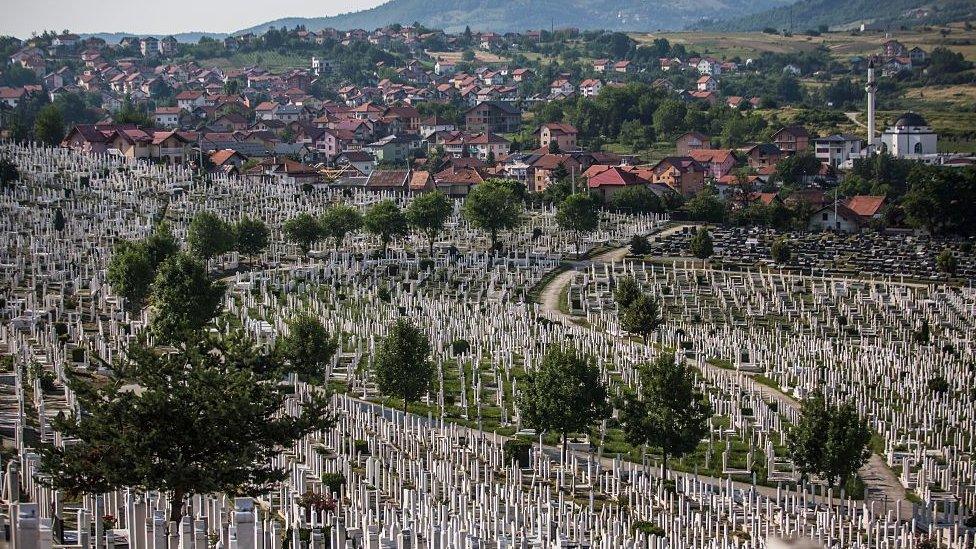
The city cemetery in Sarajevo
Karamehic-Muratovic, who is married to a Bosnian refugee and has three children under the age of five. She takes them back to her home country every year to remind them of their roots.
"I think teaching kids your culture and who you are and where they come from can serve as a protective factor," she says.
The Bosnian community has also been pulled into some of St Louis's larger racial turmoil - including the unrest that followed the 2014 police shooting of Michael Brown in nearby Ferguson.
That November, 32-year-old Bosnian refugee Zemir Begic was beaten to death near Gravois Avenue by four black and Hispanic teenagers.
"It was a big deal because it certainly didn't get the same attention as Ferguson," Karamehic-Muratovic says, a concern that was echoed in the conservative national media.
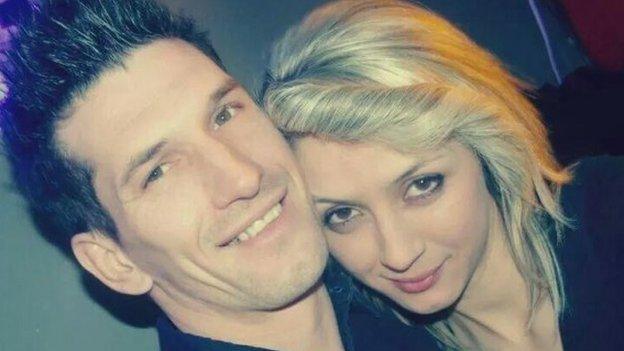
A GoFundMe online campaign raised more than $31,000 (£20,000) for Zemir Begic's funeral expenses
Are the media ignoring another St Louis killing?
About 50 St Louis Bosnians held a protest march in the neighbourhood calling for greater police protection, but tensions eased when the perpetrators were arrested and charged with first-degree murder.
Finding a voice in politics
Dzemal Bijedic, the Muslim St Louis Police chaplain, remembers fallout from the Begic murder well. He went from house to house, family to family in the Bosnian community, explaining what the police were doing to solve the crime and why their concerns weren't being ignored.
"There was a lot of tension," he said. "But they appreciate that you came and you tried.
Bijedic arrived in St Louis as a refugee in December 1997, just a few days before Christmas. Adapting to a new country and city wasn't easy - dealing with homesickness, the language barrier and the struggle to make ends meet.
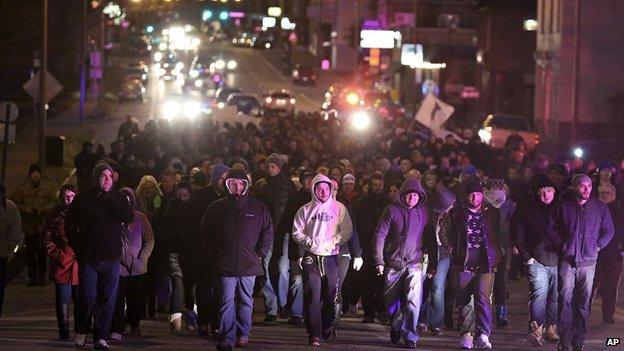
Bosnian residents protest the murder of Zemir Begic in 2014
After he earned his criminal justice degree at a local university, he became the first Muslim police chaplain in Missouri.
"We needed somebody who can help the community and teach the officers about Islamic religion and different nationalities in St Louis," he says.
The job, at times, is political and some friends have encouraged him to run for public office. He demurs.
"Politics is too much pressure," he says. "As police chaplain, I can help the community, keep peace between police officers and take care of citizens too. I don't want to sit in the office."
So far, very few Bosnian-Americans have shown an interest in getting involved in US politics.
Anesa Kajtazovic was elected in 2010 to the Iowa House of Representatives, becoming the first Bosnian-American to hold public office and, at 23, the youngest-ever member of the Iowa legislature. In 2014 she ran an unsuccessful Democratic primary campaign for a US congressional seat.
Bosnian-Americans offer a variety of explanations for the lack of interest. Susa says that the community is simply too new to fully flex its muscles in elections.
For Karamehic-Muratovic, it could have something to do with the Bosnian political experience in their home country.
"What politics means over there, it's not a very promising picture," she says. "Our politics are very corrupt and unfair and continue to be so."
US election: Two Muslim voters’ views on Donald Trump
Ajla Delkic, executive director of the Washington, DC, based Advisory Council for Bosnia and Herzegovina, says that her organisation - which advocates for Bosnian-American issues before the US Congress and encourages voter awareness - says some political reluctance could be related to the Bosnian war experience
"We would go around and ask for their name and addresses, and they'd say, 'well, do we really want the government to know that?'" she says.
"In Bosnia the government targeted them for extermination. They didn't think the US government would do that, but especially when you're fresh of the boat, as they say, there was a little bit of fear." She adds that the first priority of the newly arrived refugees was to take care of their basic human needs.
Thanks to the rise of Donald Trump and his anti-refugee, anti-Muslim speeches, Bosnian-Americans may be finding their political voice.
"In this election, given some of the rhetoric coming from one of the candidates, they really are concerned about the future and what that would mean for them personally," Delkic says.
If the first generation of Bosnian refugees are sometimes reluctant to join the political fray, Delkic says, their children, who are attending universities and entering the white-collar workforce, are more eager to participate.
It is only a matter of time - 10 or 15 years, she says - before they make their mark.
- Published1 October 2016